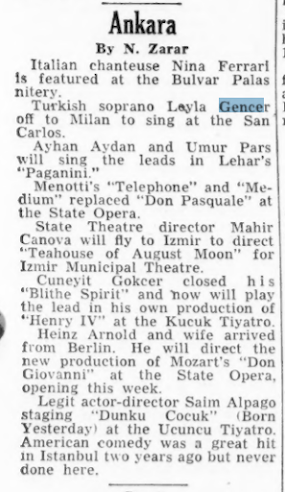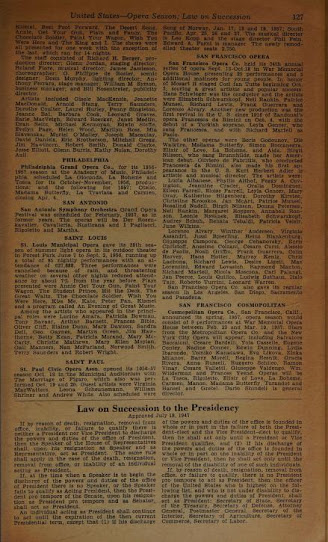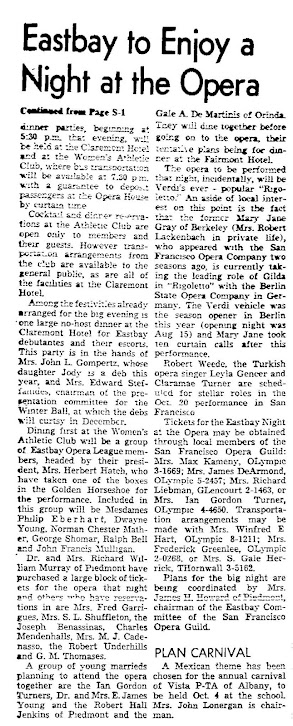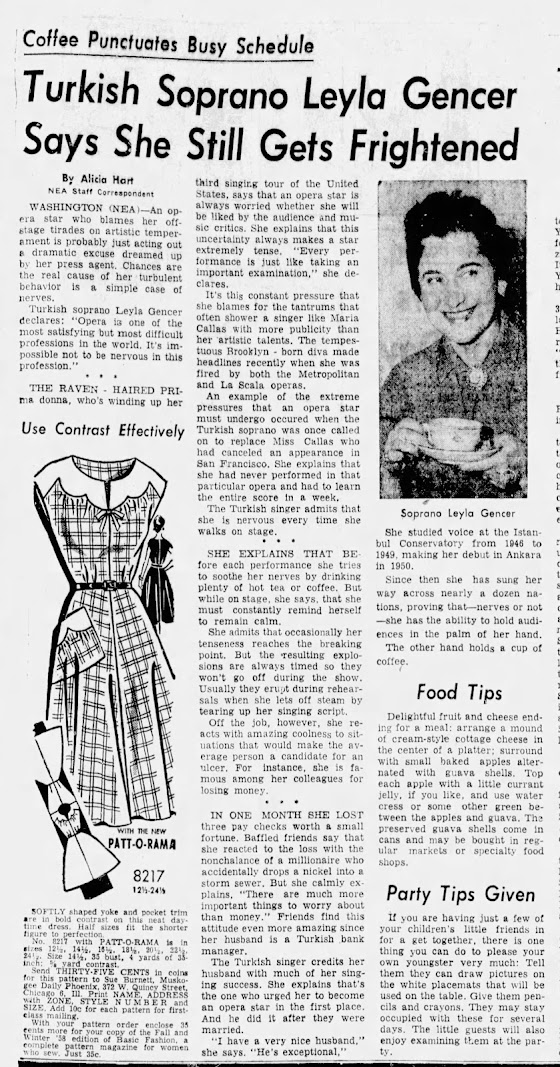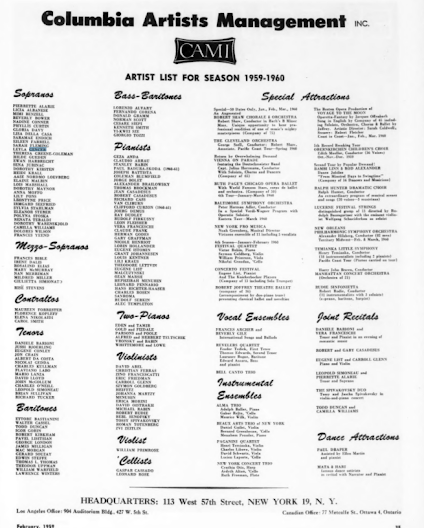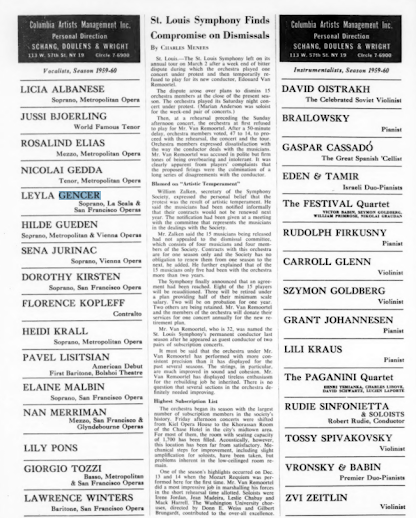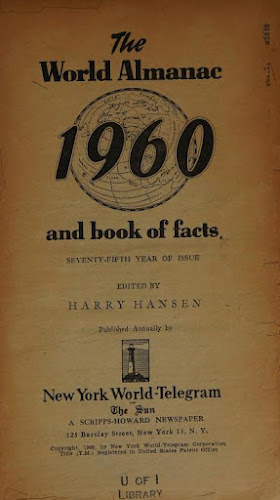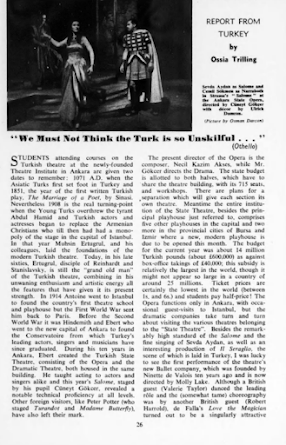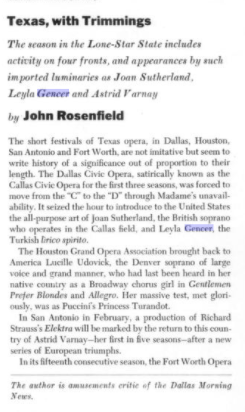1 9 5 4
OPERA MAGAZINE
1955 August
Napoli. The open-air season at the Castello di San Giusto opened on July 7 with a performance of Carmen with Pia Tassinari in the title role, Roberto Turrini as Jose, Marcella de Osma as Micaela, and Giangiacomo Guelfi as Escamillo; Mario Parenti was the conductor. Other works to be heard during the summer include La Traviata (Leyla Gencer, Giacinto Prandelli, Enzo Mascherini, conductor Pino Trost) and Turandot (Carla Martinis, Renata Scotto, Attilio Planisc, Paolo Pedani and Antonio Massaria, conductor Antonio Narducci).
1 9 5 6
VARIETY MAGAZINE
1956.02.08
THE INDEPENDENT
1956.09.09
THE MONTREAL STAR
1956.09.21
OPERA MAGAZINE
1956 October
San Francisco. Leyla Gencer, the Turkish soprano who has sung with success in Italy, especially at the San Carlo Opera, Naples, has been engaged to sing the title role in the new production of Zandonai's Francesca da Rimini, which receives its first performance on September 28. Renata Tebaldi was originally announced for this role.
WASHINGTON POST
1956.11.06
WASHINGTON POST
1956.11.09
1 9 5 7
THE WORLD ALMANAC
1957
OPERA MAGAZINE
1957 June
San Francisco. The 1957 season will open on September 17 with Turandot, and continue until October 24. Besides the American premiere of Poulenc's Les Dialogues des Carmelites and the revival of Macbeth for Callas, already announced, the repertory will include the first production by the company of Ariadne auf Naxos, which will be sung in German, with the prologue in English, and performances of Lucia di Lammermoor, Cosi fan tutte, La Traviata, Un Ballo in Ma.schera, Aida, Tosca, Madama Butterfly, and Der Rosenkavalier. Besides Callas, newcomers to the company are Rita Streich, Eugene Tobin, Gianni Raimondi, Umberto Borghi, and Giuseppe Taddei, all making American debuts. and Antonietta Stella, Nan Merriman, Leontyne Price, Helen George, Jon Crain and Robert Merrill, making San Francisco debuts. Other singers engaged include Licia Albanese, Frances Bible, Leyla Gencer, Dorothy Kirsten. Leonie Rysanek. Elisabeth Schwarzkopf, Blanche Thebom. Claramae Turner; Virginio Assandri, Otto Edelmann. Heinz Blankenburg, Richard Lewis, Ralph Herbert, Nicola Moscona and Jan Peerce. Conductors will be Erich Leinsdorf, Francesco Molinari-Pradelli (making his American debut). William Steinberg, Glauco Curiel and Karl Kritz. Paul Hager and Carlo Piccinato are the producers.
Palermo. The season at the Teatro Massimo continued with performances of Les Contes d'Hoffmann with Antonietta Pastori, Franca Duval, Leyla Gencer, Adrianna Lazzarini, Nicola Filacuridi, Corena, Guido Madzini, Ferdinando Lidonni, conductor Thomas Schippers. Ravello.
OPERA MAGAZINE
1957 July
Cagliari. A vigorous production of the Les Contes d'Hoffmann concluded the season, conducted with verve and by Thomas Schippers. The roles of Olympia, Guilietta, Antonia and Stella were sung by Antonietta Pastori, Franca Duval and Leyla Gencer, while Hoffmann was played by Nicola Filacuridi, a tenor of great freshness. Sergio Tedesco.
OAKLAND TRIBUNE
1957.07.17
SAN FRANCISCO EXAMINER
1957.08.04
OAKLAND TRIBUNE
1957.08.15
OPERA MAGAZINE
1957 September
Ankara. The world premiere of Van Gogh, a dramatic opera in five acts by the young Turkish composer, Nevit Kodalli, took place at the State Opera in February. Aydin Gun. Sevda Aydan, Suna Korad, Ayhan Baran, and Azra Gün were the principal characters. In April a revival of La Traviata took place with the same cast of last year. Two performances of this opera are expected to be given by Leyla Gencer when she returns from her engagements at the Scala. The Ankara State Opera has begun to pay regular visits and give subscription series in Istanbul every fortnight. Two performances are given in every visit. Cavalleria Rusticana and Pagliacci, and La Traviata, from last year's repertory with the same cast, were welcomed with enthusiasm.
SAN BERNARDINO SUN
1957.09.29
LOS ANGELES TIMES
1957.10.20


OPERA MAGAZINE
1957 December
San Francisco. Maria Callas had been scheduled for Lucia and Verdi's Macbeth and Antonietta Stella for Un Ballo in Maschera and Aida. Both were taken ill in Italy, with the result that Leyla Gencer, whom we had previously admired as an efficient lyric soprano, blossomed into a great coloratura as the bride of Lammermoor, Leontyne Price won her biggest operatic success as Aida, and Leonie Rysanek took the town by storm as Amelia and Lady Macbeth and also as Strauss's Ariadne and Turandot; she had originally been engaged only for the last two roles.
Trieste. The 1957-58 season at the Teatro Giuseppe Verdi opened on November 16 with II Trovatore conducted by Vincenzo Bellezza with Leyla Gencer, Dora Minarchi, Mario Filippeschi and Ettore Bastianini in the leading roles.
1 9 5 8
THE WORLD ALMANAC
1958
MUSICAL AMERICA
1958 February
MUSICAL AMERICA
1958 February
CHICAGO TRIBUNE
1958.05.06
THE MODESTO BEE AND NEWS HERALD
1958.06.08
THE SACRAMENTO BEE
1958.06.21
MUSICAL AMERICA
1958 July
OPERA MAGAZINE
1958 July
San Francisco. The autumn season is due to open on September 12 and will continue until October 23; American debuts will be made by Eugenia Ratti, Sebastian Feiersinger, Ernest Blanc, Rolando Panerai, Keith Engen, Giuseppe Modesti and Arnold van Mill; and local debuts by Lisa della Casa, Christel Goltz, Joan Moynagh, Irene Dalis, Grace Hoffman, and Cecilia Ward. The company further includes Leyla Gencer, Leontyne Price, Leonie Rysanek, Elisabeth Schwarzkopf, Sylvia Stahlmann, Claramae Turner; Jussi Bjorling, Richard Lewis, Gianni Raimondi, Eugene Tobin, Frank Guarrera, Ralph Herbert, Giorgio Tozzi and Lorenzo Alvary. The conductors will be Jean Fournet (American debut), Leopold Ludwig (American debut), Francesco Molinari-Pradelli and Glauco Curiel.
SAN FRANCISCO EXAMINER
1958.07.28
OAKLAND TRIBUNE
1958.09.11
OAKLAND TRIBUNE
1958.09.14
JOURNAL COURIER
1958.11.21
MUSICAL AMERICA
1958.12.15

INTELIGENCER JOURNAL
1958.12.16
KINGSPORT TIMES
1958.12.19
THE BRISTOL DAILY COURIER
1958.12.20
THE INDEPENDENT RECORD
1958.12.21
JACKSONVILLE DAILY JOURNAL
1958.12.21
MUSKOGEE DAILY POENIX AND TIMES DEMOCRAT
1958.12.26
SOUTHERN ILLINOISIAN
1958.12.26
THE TOWN TALK
1958.12.26
BILOXI DAILY HERALD
1958.12.27
1 9 5 9
THE WORLD ALMANAC
1959
MUSICAL AMERICA
1959.01.01
CASPER MORNING STAR
1959.01.09

SAINT JOHNS DAILY NEWS
1959.01.09
PALM BEACH LIFE MAGAZINE
1959.01.15
AKŞAM DAILY NEWSPAPER
1959 February
MÜŞERREF HEKİMOĞLU
Once, during a formal reception given at Çankaya Mansion, a British ambassador listened one of our opera artists and then asked: “Why don’t you send this young lady abroad?” “We have no funding.” they responded. The art loving ambassador then said: “Shut down one of your embassies if necessary, but help this beautiful voice improve.”
Maybe this story is fake but it’s made up well. Not all the embassies who represent our nation can promote Turkey very well. But a good artist with a beautiful voice may accomplish such mission perfectly in a short time. Here is Leyla Gencer. This precious soprano is our best ambassador of art. She presented us in the world. She became famous in Italy, Germany, Austria, America; where newspapers, magazines, radio broadcasts wrote/spoke highly of the Turkish artist with appreciation and admiration. And she was applauded by thousands of people.
We are all aware that foreign press rarely writes about Turkey and when they do, it’s only because of political reasons. They rather criticize our economic situation, or the absence of freedom regarding press, number of imprisoned reporters and even prohibition of political humour. We don’t have scientific and artistical happenings worthy of mentioning in the foreign press. And that’s why we must support with all our strength our few artists who help to build up a positive reputation for our country. I wonder by spending how many millions of liras, which of our ambassies could win the amount of the hearts won by Leyla Gencer with her beautiful voice and acting skills? Moreover, Gencer’s success and the popularity is universal.
By excluding Leyla Gencer, Ankara State Opera may have made a constitutional decision but I wonder if they could’t have made a better choice. Isn’t Gencer’s duty of being an art ambassador more important than all her other duties? Aren’t there people among opera singers who get paid anyway without even setting foot on stage? If there aren’t, then I wouldn’t have anything to say but if there are, it would have been necessary to tolerate Leyla Gencer’s absence as well. For she has a reason why she can’t perform at Ankara Opera: she attains success in foreign theaters and she promotes our country.
Personally, I think that this situation could have been handled in a friendlier way. The administrators of Ankara State Opera and Gencer could have met in person and they could have made up a plan which would allow her to continue her work as an art ambassador whilst remaining a state artist. We couldn’t understand the reason why it was decided this way so radically and fast. Wouldn’t it have been better to consider Leyla Gencer’s special condition and continue supporting her through her mission as an art ambassador?
MUSICAL AMERICA
1959 February
MESSENGER INQUIRER
1959.02.03
PANAMA CITY NEWS
1959.02.08
AKİS WEEKLY MAGAZINE
1959.02.21
İLHAN MİMAROĞLU
Leyla Gencer was fired
Last week it was announced that Leyla Gencer’s employment at Ankara State Opera is terminated. A few months ago, when the probabilities of her dismissal or her compulsory resignation were first discussed; it was rumoured that the President prevented it from happening. But this time since the well-known soprano was abroad and the President had more important things to do rather than to disrupt the plans made against estimable people; it seems that people who shall be described as nemesis of valuable assets, achieved their goals without encountering any obstacles.
It finally happened: The State Opera is now without Gencer. And more importantly a valuable artistical asset was suddenly let go. As a matter of fact, The State Opera was already without Gencer before. In between her performances abroad, the famous soprano could have performed at least two or three times at the Ankara Opera every season. But the real reason that drew Leyla Gencer to becoming indifferent towards the establishment of which she was a part of, was because she didn’t receive the same amount of respect as she did at La Scala, San Carlo or San Francisco Opera. When compared to the brightest stars of the opera world, Gencer has a more qualified voice and better musicality than Maria Callas and her dramatic capacity is superior than Renata Tebaldi’s. But are there any intendants who can rise against this type of little schemes and can see the plain truth?
One may wonder “If a monthly paycheck of 1500 liras was considered too much for Gencer?” People should know that in the western countries no opera singer or even a maid would have worked for this amount of a monthly paycheck. And not even ten times of this money could ever give the amount of reputation that Leyla Gencer acquires for Turkey.
No wonder the new Opera Intendant Necil Kazım Akses made his first blunder at this job by annulling Leyla Gencer’s contract. In the meantime, I would also like to ask this: Aren’t there any singers employed at the Ankara State Opera who earn pay checks quite equal to Gencer’s although they haven’t performed in years? And unlike Gencer, aren’t there singers who spend the foreign currencies of the government during their stays abroad?
BARTLESVILLE EXAMINER ENTERPRISE
1959.02.22
THE EDMOND JOURNAL
1959.02.25
MUSICAL AMERICA
1959 March
OPERA MAGAZINE
1959 March
Philadelphia. The first five operas of the Grand Opera Company's 24th season were Un Ballo in Maschera (Nelli, Marie Traficante, Belen Amparan, Giuseppe Campora, Cesare Bardelli), Carmen (Amparan, Richard Cassilly), Il Trovatore (Anita Cerquetti, Irene Kramarich, Walter Fredericks, Frank Valentino), II Barbiere di Siviglia (Giulietta Simionato, Thomas Hayward, Frank Guarrera, Nicola Moscona, Gerhard Pechner), and La Traviata (Leyla Gencer, Eugene Conley, Cornell MacNeil). Giuseppe Bamboscheck conducted all the performances.
TIME COLONIST
1959.03.02

VICTORIA DAILY TIMES
1959.03.02
OPERA MAGAZINE
1959 May
Firenze. La Battaglia di Legnano (Verdi). May 10, 12. 17 Leyla Gencer, Gastone Limarelli. Giuseppe Taddei. Conductor Vittorio Gui; producer Franco Enriquez.
MUSICAL AMERICA
1959 June
OPERA MAGAZINE
1959 June
Genoa. Teatro Carlo Felice. II Trovatore (Leyla Gencer, Barbieri, Franco Corelli, Anselmo Colzani; conductor Oliviero de Fabritiis, producer Franco Zeffirelli)
CORPUS CRISTI TIMES
1959.05.19
LEDGER STAR
1959.07.04
THE MORNING UNION
1959.07.26
CUMHURİYET DAILY NEWSPAPER
1959.08.18
CEVAT FEHMİ BAŞKUT
We Turkish people are unlike other
The King of Greece gave one of the most important legion of honours to one of their opera singers. The reason for this appreciation and rewarding is because the mentioned artist has been singing at German theatres for 14 years and never visited homeland during all that time. And since this artist has been performing at foreign opera theatres and promoting Greece as a representative of Greek Art, she was found worthy of rewarding.
How similar actions are valued and rewarded differently in every nation!
Didn’t our Leyla Gencer do exactly the same thing even more successfully and brilliantly? Wasn’t that her who sang as a protagonist at the most important theaters of America and Europe? Wasn’t that her who got invited to one foreign embassy to another? Wasn’t that her who made herself and her country applauded by the foreign opera public, when some people didn’t know even the location of Turkey in the map? Wasn’t it her for whom European and American press wrote articles full of appreciation.
And what did we do in return for all this? We don’t have any legions of honours to give out. And we surely don’t have the tendency to build statues for living people to show our appreciation. But some things had to be done. And so, we did! We sent her a telegram which said, “Come straight back to Ankara!”. She responded “I can’t come these months. I had taken permission since I have signed contracts”. Then, “Is that so?” we asked and terminated her contract with the Ankara State Opera. We dismissed her from our national theatres. We cut off her “three pennies” pay check. Yes, this is exactly how we rewarded the important representative of the Turkish Performing Arts; a traveller of the world; the most heard, appreciated and loved Turkish woman!
This is the approach of our government. It’s obvious to see how many centuries of difference there is between us and Greeks. What can we say? A situation to cry over!
CUMHURİYET DAILY NEWSPAPER
1959.08.24
LÜTFİ AY
Interview
We were once again facing each other after a prolonged break. But with one difference; this time we were at the spacious terrace of Çınar Hotel facing Marmara Sea, instead of the Gencers’ lovely penthouse balcony in Ankara. Leyla whom I used to encounter in Ankara, was always in between travels, a bit agitated, getting prepared for new productions excitedly and restlessly. But this time she was enjoying the delightful peace of a rather long and thorough period of rest. She was so perfectly embraced by the sun and the sea of Istanbul, which she’d yearned for a long time that; the white primadonna had become a real Aida in her exotic print beach dress, with her black hair that she’d combed back and adorned with a bandana.
First, we had a rambling conversation. Then I asked the questions that she avoids the most but which are the ones that her fans are most interested in.
“Why and how did you resign from Ankara State Opera?”
Leyla frowned and spoke in a reproachful way:
“Well you know this matter better than me.” she said
“No” I said. “What we know doesn’t matter. We would like to hear it from you.”
After a moment of hesitation, Leyla responded:
“Alright, I will tell you exactly what happened. But first, I would like to underline this: I didn’t willingly leave the stage that I loved and grew on, but I was obliged to do so. I’ve always kept the promise that I had given to a great person whom I fully respect and love and who’s always been interested in my artistry. I didn’t want to cut ties with the State Opera.
“Then how did that happen if you didn’t want it so?”
“It’s as simple as this: When the management of the opera changed, the perception of art and its appreciation also changed with it. People have always asserted claims that I was never present in Ankara, that I never got on stage and I spent all season abroad.
The previous intendant, my teacher Muhsin Ertuğrul, was a genuine artist who knew that a Turkish artist who is valued and accepted at international theatres would eventually face hard challenges and competition. And in order to succeed, one has to stay there and work hard. He also knew and appreciated the national benefits that would come out of this accomplishment, for both our opera and our country. So that’s why he always gave me permission and liberated me for my deeds abroad. He knew that Maria Callas had become famous after 19 years of struggle, vast range of opportunities provided by a millionaire husband and an enormous amount of publicity. I tried to gain the same result just in a period of 5 years, only with my personal efforts and God given talent. And fortunately, I succeeded.”
An Italian journalist had pointed out exactly this fact while interviewing her at Spoleto Festival.
“Didn’t you get any financial support from the State Opera during your performances in Europe?”
“No, I just received my monthly pay check which only paid the expenses for the apartment that I had to preserve in Ankara. Whereas all my colleagues who went on one year or longer educative journeys abroad not only received money for the road but also kept on receiving their pay checks in foreign currents too. I never received any money from the government; neither money for my trips, nor any foreign currency or allowance.
During the time that I stayed and worked in Europe and America, I paid all my expenses with the money that I received from the foreign theaters where I performed as a professional artist. By the way, it’s occasionally written in some newspapers that I’m “invited” to sing in various places. The concept of these invitations is misunderstood and I would like to clear it out. An invitation for a professional opera artist means a business contract. The artist works under the terms and conditions of the contract and receives the sum of money stated in the contract for the work done. The artist pays all the personal expenses with the cachet earned.”
“Is artistic training expensive in Europe?”
“It’s quite expensive. During the opera season, I study at least four hours a day. And I always do these trainings with the best teachers and corepetitors. In Italy, an hour lesson’s cost equals approximately to 45-50 Turkish liras. So accordingly, the monthly pay check that I used to receive from the State Opera paid only a quarter of my lessons.”
“Are these trainings essential for your art?”
“Of course! When I first got on the stage in Europe in 1954, I only had 4 operas in my repertoire. But today I know by heart and can perform 38 operas all written in foreign languages. A soprano with an international fame is supposed to have a richer repertoire in order to fulfil the expectations that might come from various theatres.”
“Do you think that maybe your contract at the State Opera had to be terminated because of an administrative acquirement, since you couldn’t perform at the Ankara Theater?”
“I don’t think so. Because in the first three of the past five years I performed at the Ankara Opera every season, weather less or more. And in the last two years: I always told the opera administration that I would perform in Ankara for a month or two if I were informed in 6 months advance. But the administration never prepared a schedule that considered my condition.
“Thank you very much. I exhausted you in your rest period.”
“Not at all. I thank you since you bothered to come here to talk to me on such a hot day. I spoke gladly because I want all your readers and music lovers to know these facts. Send my regards and love to my audience before whom I would happily perform again one day.
THE GUARDIAN
1959.09.03
TUCSON DAILY CITIZEN
1959.09.05
1 9 6 0
THE WORLD ALMANAC
1960
Unknown Newspaper
1960s
CHRISTIAN SCIENCE MONITOR
1960.05.07
OPERA MAGAZINE
1960 July
THEATRE WORLD MAGAZINE
1960 July
1 9 6 2
OPERA MAGAZINE
1962 February
Bologna. The season at the Teatro Comunale opened on November 25 with Un Ballo in Maschera conducted by Oliviero De Fabritiis. with Leyla Gencer as Amelia, Dora Gatta as Oscar, Adriana Lazzarini as Ulrica. Carlo Bergonzi as Riccardo and Mario Zanasi as Renato.
1 9 6 3
OPERA MAGAZINE
1963 January
Florence, Teatro Comunale, Der Freischütz. Leyla Gencer, Orietta Moscucci, Mirto Picchi, Nicola Zaccaria; c. Vittorio Gui; p. Frank De Quell; d. Cajo Kiihlny. December 16, 19, 22, 29
Bologna, Teatro Comunale, November 30 to January 20 Don Carlos. November 30, December 2, 5 Don Giovanni. December 12, 16 Lucrezia Romana (Respighi). II Segreto di Susanna (Wolf-Ferrari). November 20, 23 II Maestro di Cappella (Cimarosa). Isabeau, Mascagni. December 26, 30, January 3 La Boheme. December 29, January 1, 6 Tannhiiuser. January 12, 15, 20 The Love of Three Oranges. January 17 (by the Ljubljana Opera) Artists engaged include: Maria van Doehgen, Carla Ferrario, Gigliola Frazzoni, Mirella Freni, Licia Galvano, Rena Garazioti, Leyla Gencer, Gianna Maritati, Giuliana Matteini, Sofia Mezzetti,
Barcelona. The 1962-63 season at the Grand Teatro Liceu opened on November 3 with Norma with Leyla Gencer singing the title-role for the first time. Fiorenza Cossotto was heard as Adalgisa, Bruno Prevedi as Pollione and Ivo Vince as Oroveso. Mario Parenti was the conductor.
Vienna. Performances at the State Opera during November have included Don Carlos with Leonie Rysanek and Leyla Gencer alternating as Elisabeth de Valois, Biserka Cvejia as Eboli, and Giuseppe Zampieri in the title-role, Aldo Protti as Posa, Nicola Zaccaria as Philip and Hans Hotter as the Grand Inquisitor, c. Nino Verchi;
Glyndebourne. We hear that . . . Leyla Gencer will return to Glyndebourne next summer.
Monte-Carlo. We hear that . . . Leyla Gencer will be heard as Donna Anna in Monte Carlo in February
Trieste. We hear that . . . Leyla Gencer will be heard as Lida in La Battaglia di Legnano at Trieste in March.
Barcelona. The 1962-63 season at the Grand Teatro Liceu opened on November 3 with Norma with Leyla Gencer singing the title-role for the first time. Fiorenza Cossotto was heard as Adalgisa, Bruno Prevedi as Pollione and Ivo Vince as Oroveso. Mario Parenti was the conductor.
Vienna. Performances at the State Opera during November have included Don Carlos with Leonie Rysanek and Leyla Gencer alternating as Elisabeth de Valois, Biserka Cvejia as Eboli, and Giuseppe Zampieri in the title-role, Aldo Protti as Posa, Nicola Zaccaria as Philip and Hans Hotter as the Grand Inquisitor, c. Nino Verchi;
Glyndebourne. We hear that . . . Leyla Gencer will return to Glyndebourne next summer.
Monte-Carlo. We hear that . . . Leyla Gencer will be heard as Donna Anna in Monte Carlo in February
Trieste. We hear that . . . Leyla Gencer will be heard as Lida in La Battaglia di Legnano at Trieste in March.
OPERA MAGAZINE
1963 July
Trieste. Events during the latter part of the season at the Teatro Giuseppe Verdi included La Battaglia di Legnano with Leyla Gencer, Joao Gibin, Ugo Savarese, Marco Stefanoni, Silvio Maionica, c. Francesco Molinari-Pradelli
Monte Carlo. The season ended with performances of Don Giovanni (Leyla Gencer, Ilva Ligabue, MarieIla Adani, Renato Capecchi, Richard Holm, Erich Kunz, Renato Cesari, Giovanni Foiani, c. Manno Wolf-Ferrari).
Monte Carlo. The season ended with performances of Don Giovanni (Leyla Gencer, Ilva Ligabue, MarieIla Adani, Renato Capecchi, Richard Holm, Erich Kunz, Renato Cesari, Giovanni Foiani, c. Manno Wolf-Ferrari).
OPERA MAGAZINE
1963 October
New York. The Friends of French Opera will give a concert version of Halevy's La Juive at Carnegie Hall on March 12 next, with a repeat performance at the Brooklyn Academy on March 17. Richard Tucker will be heard as Eleazar, Leyla Gencer as Rachel, Micheline Tessier as Eudoxie, Jean Deis as Leopold and Norman Treigle as Cardinal Brogni (Chester Watson at Brooklyn). Robert Lawrence will be the conductor.
CORRIERE INTERNAZIONALE DEL TEATRO
1963.10.01
OPERA MAGAZINE
1963 November
Venice. Verdi's Gerusalemme, the Italian translation of Jerusalem which was the French version (with several additions) of I Lombardi, returned to the Italian stage after almost a century, when it was revived at the Teatro La Fenice on September 24. The leading roles were sung by Leyla Gencer, Giacomo Aragali and Giangiacomo Guelfi. Gianandrea Gavazzeni was the conductor and Jean Vilar the producer.
L'UNITA
1963.11.15
OPERA MAGAZINE
1963 December
Venice. We hear that...Leyla Gencer will sing the title-role in Bellini's Beatrice di Tenda at the Teatro La Fenice, Venice
Naples. We hear that... Leyla Gencer will sing Elisabeth in Donizetti's Roberto Devereux at the Teatro San Carlo, Naples
Buenos Aires. We hear that... Leyla Gencer will sing Norma and Amelia in Simone Boccanegra at the Teatro Colon, Buenos Aires, during the 1963-4 season.
Napoli. Roberto Devereux, Donizetti. Leyla Gencer, Anna Maria Rota, Renato Cioni; c. Mario Rossi; p. Margherita Wallmann (May 2, 6, 10)
Buenos Aires. We hear that... Leyla Gencer will sing Norma and Amelia in Simone Boccanegra at the Teatro Colon, Buenos Aires, during the 1963-4 season.
Napoli. Roberto Devereux, Donizetti. Leyla Gencer, Anna Maria Rota, Renato Cioni; c. Mario Rossi; p. Margherita Wallmann (May 2, 6, 10)
1 9 6 4
OPERA MAGAZINE
1964 January
Milan, Teatro alla Scala. Don Carlos. With Leyla Gencer, Fiorenza Cossotto, Bruno Prevedi, Ettore Bastianini, Nicolai Giaurov. c. Gabriela Santini; p. Margherita Wallmann; d. Georges Wakhevitch (December 11)
Venice, Teatro La Fenice. Beatrice di Terida, Bellini. With Leyla Gencer (January 9, 12, 15)
Venice, Teatro La Fenice. Beatrice di Terida, Bellini. With Leyla Gencer (January 9, 12, 15)
JORNAL DO BRASIL
1964.05.04
JORNAL DO BRASIL
1964.05.26
OPERA MAGAZINE
1964 June
Rio de Janeiro. The 1964 season at the Municipal Theatre Otello with Leyla Gencer, Del Monaco, Cappuccilli, Zaccaria, c. Molinari-Pradelli.
OPERA MAGAZINE
1964 July
Chicago. Bumbry will also share the role of Eboli with Fiorenza Cossotto in Don Carlos, with Leyla Gencer, Richard Tucker, Tito Gobbi, Nicolai Giaurov and Bruno Marangoni, c. Bruno Bartoletti, p. Christopher West.
New Orleans. Leyla Gencer will be heard as Leonora in ll Trovatore on November 12 and 14 with Richard Torigi as Luna.
Milano. There were further performances of Don Carlos, 11 Barbiere di Siviglia and Macbeth (in which Leyla Gencer replaced Birgit Nilsson)
JORNAL DO BRASIL
1964.10.28
OPERA MAGAZINE
1964 November
Naples, Teatro San Carlo. Norma. With Leyla Gencer, Fiorenza Cossotto, Cecchele, Ivo Vinci); c. Hermann Scherchen, p. Carlo Maestrini, d. Camillo Parravacini
Rome, Teatro dell'Opera New productions: / Vespri Siciliani, with Leyla Gencer, Gastone Limarilli, Giangiacomo Guelfi, Boris Christoff, c. Gianandrea Gavazzeni, p. Franco Enriquez, d. Polidori;
LA STAMPA
1964.11.07




